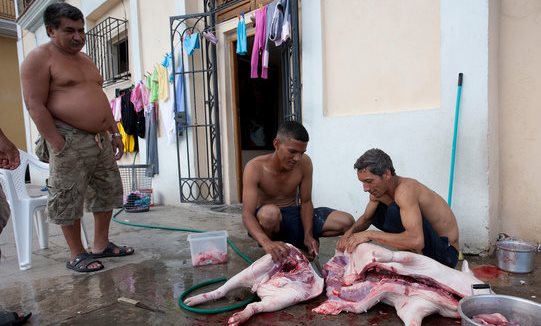HAVANA — There was a time, Alexi remembers, when life in Cuba was simpler. People dressed properly. Children respected their elders. Stealing was stealing.
“My father brought me up with a strict set of values,” said Alexi, 46, an unemployed chauffeur from a gritty quarter of the capital. “But that has been lost.”
So Alexi had little to argue with this month when President Raúl Castro unleashed his fiercest and lengthiest public lecture to date on the demise of Cuban culture and conduct. In a speech to the National Assembly, Mr. Castro said that Cubans’ behavior — from urinating in the street and raising pigs in cities to taking bribes — had led him to conclude that, despite five decades of universal education, the island had “regressed in culture and civility.”
Cubans build houses without permits, catch endangered fish, cut down trees, gamble, accept bribes and favors, hoard goods and sell them at inflated prices, and harass tourists, Mr. Castro said.
And that is just the start: Islanders yell in the street, curse indiscriminately, disturb their neighbors’ sleep with loud music, drink alcohol in public, vandalize telephones, dodge bus fares and throw stones at passing trains, the president lamented.
“They ignore the most basic standards of gentility and respect,” Mr. Castro continued. “All this is going on under our noses, without provoking any objection or challenge from other citizens.”
“I have the bitter sensation that we are a society that is ever better educated, but not necessarily more enlightened,” Mr. Castro said.
His scathing assessment resonated with many Cubans, who bemoan the rise in petty corruption and uncouth behavior, nostalgic for the days when a state salary was enough to live on without needing to pilfer, and Cuba’s education system garnered international praise.
But while Mr. Castro rebuked his countrymen for losing their “honesty, decency, sense of shame, decorum, honor and sensitivity to others’ problems,” many Cubans accused the government of clinging to an unworkable economic system while the country’s infrastructure and social services crumbled and, with them, the people’s sense of communal duty.
“He should have taken responsibility,” said Alexi, who asked that his full name not be used because he was discussing the Cuban leadership.
Cubans’ morals had been broken, he said, by the “special period” of severe economic hardship that followed the collapse of the Soviet Union, when many people resorted to stealing, scams and, in some cases, prostitution to get by. Standing shirtless outside his small house, Alexi pointed to his 24-year-old son, fixing a hubcap on the sidewalk.
“How could I raise him with the same morals, when just to put rice, beans and pork on the table requires all kinds of illegalities?” he said. “I had to teach him the values of survival.”
In her cramped, airless apartment downtown, Rosa Marta Martínez, 65, agreed.
“What do you expect?” said Ms. Martínez, who shares the only bedroom with two grandchildren and a great-grandchild. “People have housing problems. Food prices are high. They are desperate.”
In Ms. Martínez’s dilapidated building, the thump of reggaeton, which has replaced timba, a form of Cuban dance music, as the national soundtrack, blasted from across the street. Residents said children played in the corridors until late at night and neighbors crashed about at all hours and ignored their complaints. In the nearby streets, garbage was piled on the curb beside empty trash bins.
Still, Havana has avoided the rampant crime and drug violence that plague many Latin American — and American — cities. And in spite of complaints about deteriorating manners, many Cubans maintain a sense of community and remain close to family, sharing food or helping out friends and neighbors.

























